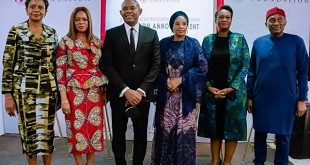Current shortcomings reflect decades of underinvestment in the health sector, leaving it to communities to figure out how to cope with the consequences of understaffed health centers and shortages of essential medicines. Though it is too early to say if the approach in Ghana or South Africa will actually work, the pressure for more governments to adopt comprehensive post-lockdown strategies has increased amid evidence that without a vaccine COVID-19 could “smolder in transmission hotspots” for years, according to Matshidiso Moeti, WHO’s regional director for Africa. She said countries like Cameroon, South Africa, and Algeria, but also smaller nations, will need to be able to rapidly detect and contain flare-ups or risk seeing their health services regularly overwhelmed with COVID-19 patients. The regimes dragging their feet fret about overstretched domestic resources and warn they can get little help from international bodies at the moment. But the current shortcomings also reflect decades of underinvestment in the health sector, leaving it to communities to figure out how to cope with the consequences of understaffed health centers and shortages of essential medicines.
Activists in the countries that are struggling to emerge from lockdowns warn that the regimes are throwing together piecemeal approaches that threaten to leave swaths of people stranded.
In Zimbabwe, where the government has twice extended the country’s lockdown, officials announced this month that businesses could reopen but only after all of their employees had been tested. While government tests are available, Jestina Mukoko, the chairperson of the Zimbabwe Human Rights NGO Forum, said the reality is that the burden of paying for the testing is falling on the businesses and the fear is they will push it to their employees—an impossible burden in a country where large numbers can barely afford to buy food. The country’s vast informal sector, meanwhile, remains shuttered.
In Kenya, the security services threw people into quarantine centers if they exhibited symptoms or if they broke curfew. They eventually emerged with outsized bills for the cost of the stay in cramped, unsanitary quarters. And in Uganda, the government mandated that people wear masks when they leave their houses—but without providing supplies to already overstretched citizens. Museveni’s administration has since announced it will provide people with masks, but the process could take weeks.
They are not the only governments that are floundering. Administrations from Mozambique to Togo have struggled to identify a post-lockdown strategy. In its place, however, spontaneous, uncoordinated community efforts to address specific problems have emerged.
The outset of the pandemic was marked by innovations or interventions to meet the emerging understanding of the virus and the risks it posed.
Markets were rearranged to reduce the risk of exposure, and tailors began stitching together masks. Even in Ghana and Liberia, where governments mounted more aggressive responses, universities started producing hand sanitizer to supplement those efforts.
As the crises have multiplied amid the lockdown, interventions across the subcontinent have expanded to include food delivery and cash transfers for the most vulnerable. In Uganda, a network of young HIV activists are filling dwindling ARV prescriptions for patients trapped in their homes. In Zimbabwe, one woman living on the outskirts of the capital, Harare, is running an informal kitchen feeding dozens of people each day. Even in South Africa, where the government has done more to strengthen the social safety net than most, some people are still facing dire food shortages, which has spurred solidarity networks to help feed those most in need.
As the crises have multiplied amid the lockdown, interventions across the subcontinent have expanded to include food delivery and cash transfers for the most vulnerable. The Mombasa-based NGO Muslims for Human Rights, known as Muhuri, had a coronavirus crisis management team organised before the virus even reached Kenya, said Abubakar Zein, the executive director. A day after the first case was confirmed, Muhuri was ready to begin assisting anyone who needed help in the districts where it worked, primarily in the country’s Coast Province along the Indian Ocean. Its early focus was on improving sanitation in areas where clean water was a luxury—so it distributed small water tankers alongside messages about hand-washing.
Even as Muhuri’s activities have grown to include transferring cash to the most vulnerable and monitoring human rights violations, Zein acknowledges the scale of Kenya’s need overwhelms what his organisation can offer even in the seven districts where it works.
It is a pattern playing out across the continent. Organisations and individuals can supplement government programs; they cannot replace them. But “in showing how it can be done, it’s agenda-setting,” Zein explained. That agenda is to constantly remind the government of its obligation to protect its citizens.
Already, the community groups have made progress on that front. Amid public pressure and the threat of a court case, the Kenyan government ended its policy of charging outrageous fees for its enforced quarantines. In Zimbabwe—where few citizens knew how to access coronavirus treatment—Mukoko’s network convinced officials to compel the national broadcaster to regularly provide this information. Another Kenyan NGO, the Green String Network, replaced early posters the government had created warning about COVID-19, which were adapted from other countries, with more culturally appropriate messages.
“We don’t have enough resources to resolve most of our problems,” Zein said. “But we have enough intellectual input and persuasion to ask important questions and influence people to think like us.”
They also have the lessons of earlier social movements to draw on, particularly the push by Katana and other activists to overcome HIV denialism or government disinterest and expand testing and access to lifesaving treatment regimens. Like those earlier generations, Zein said, community-based groups are prepared to leverage whatever is necessary—demonstrations, lawsuits, pressure from international allies—to compel faltering governments toward a compassionate, comprehensive strategy and to ensure more than misery emerges from the lockdowns.
****
Source: Foreign policy
 The Independent Uganda: You get the Truth we Pay the Price
The Independent Uganda: You get the Truth we Pay the Price


